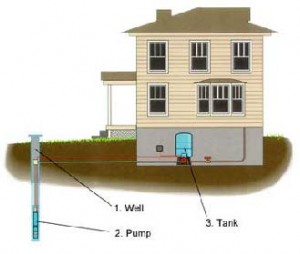 Where does your drinking water come from? Is it safe to drink? Is there anything you can do to keep your drinking water safe? These are all important questions to ask in order to protect yourself and your family.
Where does your drinking water come from? Is it safe to drink? Is there anything you can do to keep your drinking water safe? These are all important questions to ask in order to protect yourself and your family.
WHERE DOES MY DRINKING WATER COME FROM?
Seventy percent of the people in Minnesota obtain their drinking water from groundwater, either from private or public wells. Groundwater is pumped from underground geological formations called aquifers. Aquifers contain water in cracks and crevices in bedrock, or in pore spaces between soil particles.
 How is water pumped into households?
How is water pumped into households?
A well is the most common way to obtain groundwater for household use. A well is basically a hole in the ground, held open by a pipe (casing) that extends to an aquifer. A pump draws untreated water from the aquifer for distribution through the plumbing system.
HOW DO WELLS POTENTIALLY CONTAMINATE DRINKING WATER SOURCES?
Many times there are layers of rock and soil that lie between an aquifer and the land surface, or between aquifers, which act as natural barriers and protect against the spread of contamination. However, a well provides an open channel between the land surface and an aquifer – or between a shallow aquifer and a deeper aquifer. This open channel (well) may allow contamination to enter into aquifers (drinking water supplies) and bypass these protective barriers.
WHY IS THIS IMPORTANT?
Properly managing private wells is important because it can keep contamination from entering into drinking water supplies. If contamination enters into your drinking water it may threaten the quality of your water, your neighbor’s, or the City’s. If contamination levels reach high enough thresholds it may require the installation of a water treatment system or the drilling of a new well. Both of these items may cost thousands of dollars.
WHAT CAN YOU DO TO PROTECT YOUR DRINKING WATER?
- When landscaping your yard, keep the top of your well at least 1 foot above the soil surface. Slope the soil away from the well casing to allow surface water to drain away from your well.
- Do not pile snow, leaves, or other materials around the well. This will help keep insects, dirt, and other contaminants from entering your well.
- Consider the location of your well when making physical changes to your property. Follow all MN Dept. of Health required setbacks from buildings and potential contaminant sources.
- Hire a licensed well driller to seal unused wells.
- When working near your well, be careful not to disturb or damage the well casing.
- Inspect your well regularly for physical changes or damage. Be sure all well covers and connections are properly attached and in good condition. If damage is detected, contact a licensed well driller to determine steps needed to repair the well.
- Do not mix or work with hazardous chemicals like pesticides, fertilizers, paints or motor oil, near your well.
- Take steps to prevent a cross connection and back-siphonage of materials into your plumbing system and well.
WHERE CAN I GET ADDITIONAL INFORMATION?
You can get additional information by contacting the MN Dept. of Health at (651) 201-5000 or visiting the following websites:
- http://mrwa.com/
- http://www.health.state.mn.us/divs/eh/wells/
- http://www.health.state.mn.us/divs/eh/wells/construction/handbook.pdf
VIEW ADDITIONAL FACT SHEETS
- Wellhead Protection Plan Brochure
- Backyard Rake Fact Sheet
- Local Drinking Water Fact Sheet
- Household Hazardous Waste Flier